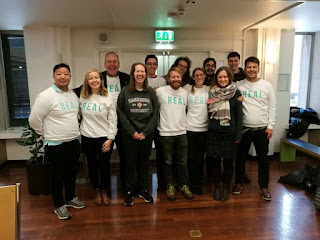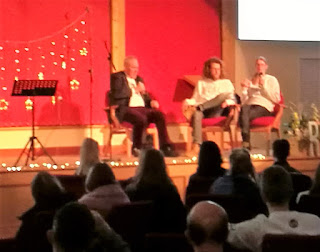 Our last stop in England
before we would go island hopping to Ireland, was the beautiful city
of Oxford. Our dear friend Bruce invited us to see the city where he
lived and the Bible college where he used to lecture, Wycliff Hall.
After an intensive week in community life it would be great to be
among students again. For we were hosted at Wycliff in a guestroom –
usually reserved for special guest lecturers – and taken under the
care of one of the students, Romala.
Our last stop in England
before we would go island hopping to Ireland, was the beautiful city
of Oxford. Our dear friend Bruce invited us to see the city where he
lived and the Bible college where he used to lecture, Wycliff Hall.
After an intensive week in community life it would be great to be
among students again. For we were hosted at Wycliff in a guestroom –
usually reserved for special guest lecturers – and taken under the
care of one of the students, Romala.
We had a great time
sharing stories, sharing dinner and watching TV shows together. At
this time we were following the Dutch TV game show Wie is de mol?
which was coming to a close and
one of the students, Julian from Texas, was very interested to
see if he could follow despite it being in Dutch. It turned out to be
very funny to watch together.
 Bruce guided us through
the city of Oxford, and he turned out to be a great guide, telling us all about the history and buildings of the city of which he is so proud. And, being a member of Christchurch College, he
could bring us for free to the school that was starred as Hogwards
School of Wizardry and Witchcraft. However, Bruce was much more
interested in the real heroes of Oxford, J.R.R. Tolkien, C.S. Lewis
and Lewis Carroll, the writers of The Lord of the Rings, the
Chronicles of Narnia and Alice in Wonderland. As we are both fans of
books, the highlight was a five store high bookstore, Blackwells.
Bruce guided us through
the city of Oxford, and he turned out to be a great guide, telling us all about the history and buildings of the city of which he is so proud. And, being a member of Christchurch College, he
could bring us for free to the school that was starred as Hogwards
School of Wizardry and Witchcraft. However, Bruce was much more
interested in the real heroes of Oxford, J.R.R. Tolkien, C.S. Lewis
and Lewis Carroll, the writers of The Lord of the Rings, the
Chronicles of Narnia and Alice in Wonderland. As we are both fans of
books, the highlight was a five store high bookstore, Blackwells.
To add to our list of
different Christian confessions we've engaged with in our journey, we
were introduced to the Anglican church, The Church of England. What
amazed us was how this church is able to combine an array of
different church traditions in different church services together. So
even when people prefer to express their faith differently, they are
still part of one community and see each other at other church
events.
After Oxford, we drove to
Liverpool, to catch our ferry to Dublin. No stormy cancellations this
time, only a rescheduling of our ship, which meant that we got a bed,
even though we only ordered seats.
In Ireland we planned to
visit our friend, Iris, who was studying together with us in
Wageningen, and is now working on her PhD in Cork. When we asked if
she could host us, she came with a surprisingly positive response: 'I
can arrange a house for you.'
Members of her church
community have moved from Ireland to England, but still could not
sell their old house. And because for the insurance someone had to
live in this house. So, our friend offered to live as a caretaker in
this house, and therefore we could live there together with Iris for
the next two weeks.
During the ferry crossing
Irma felt very sick. But it was not from the boat, the next day she
felt just as nauseous. Though it turned out to be good news; Irma is
pregnant! We have a new journey ahead of us, the one of becoming
parents. As for the sickness, the two weeks that we were in Ireland
Irma felt sick most of the time and had a difficult time. We felt so
blessed with this lovely house to rest these days, and the little we
had planned. No busy weeks helping missionaries or working in the
garden, being able to cook ourselves to see what Irma could eat. This
was Gods perfect planning.
Though Ireland is too
beautiful to only stay inside the house. Irma loves this country and
wanted to show Gideon its treasures. We went to the west coast for
two days to explore the ring of Kerry and the city of Killarney.
Above that, we had a beautiful walk with Iris at cliffs in the south
and visited Cobh, where the Titanic last made her last stop.
It wouldn't be us to only
stay in the house and we wouldn't want to be somewhere without meeting
people. We went together with Iris to her bible study group in
Fermoy. For two weeks we were part of a very diverse group of people,
coming from different churches together. When we joined they were
watching a series of lectures by Danielle Strickland.
We joined the church
services of the Presbyterian church on Sundays, but above that each
Sunday they hold a praise night, which we gladly joined. Gideon
joined the music team, switching from piano to guitar to bass guitar.
We were also invited for the valentine diner of the church, so after
two weeks we had met so many wonderful people. Many mothers shared
their experiences and advice with Irma, and Gideon enjoyed making
music together with others.
There is no other way to
end this blog post than with this Celtic blessing:
May the road rise to
meet you,
May the wind be always
at your back,
May the sun shine warm
upon your face,
the rain fall soft
upon your fields,
and until we meet
again,
may God hold you in
the palm of his hand.
















